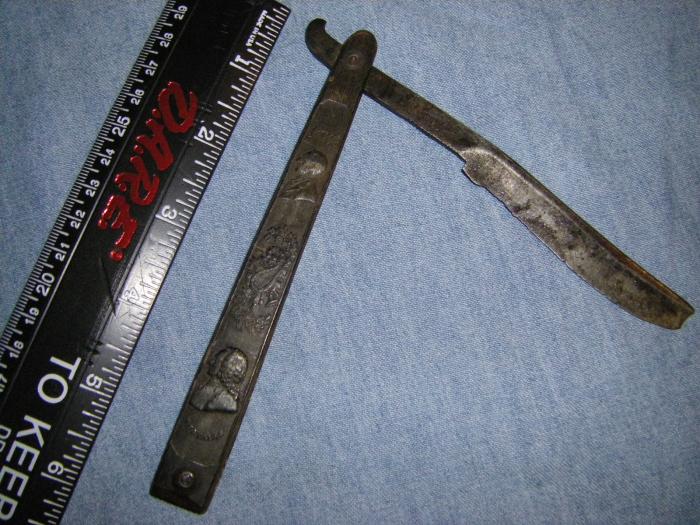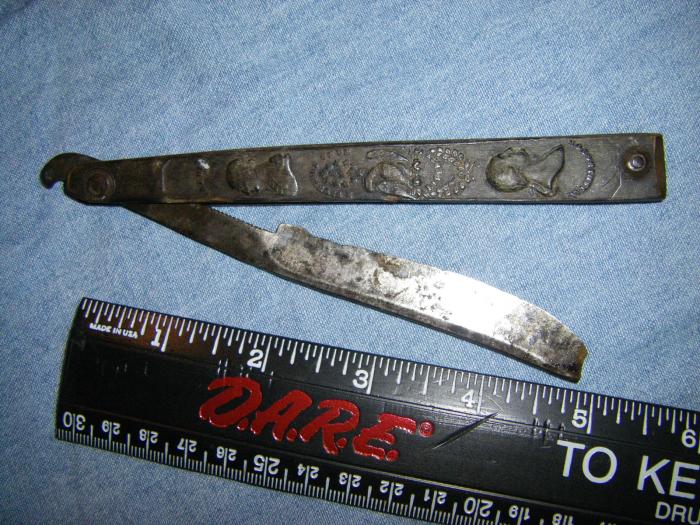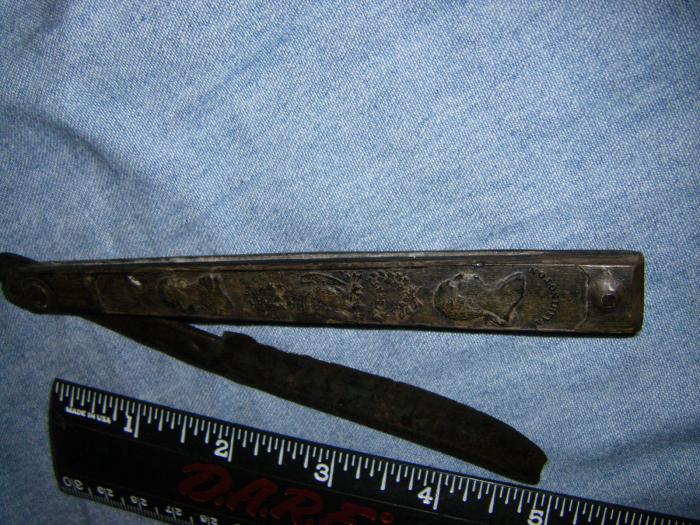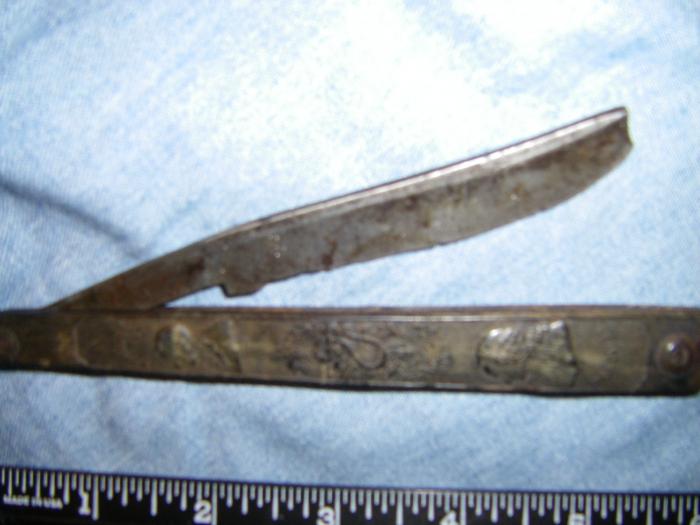Results 1 to 7 of 7
Thread: Need Expert Advice
-
11-26-2008, 08:44 PM #1Junior Member

- Join Date
- Nov 2008
- Location
- Baton Rouge, La.
- Posts
- 2
Thanked: 1 Need Expert Advice
Need Expert Advice
I have had in my possession for nearly 50 years a razor that the handle appears bone or wood. It has carved busts of "PREBLE" (I assume Edward 8/1761-8/1807), "WASHINGTON" (I assume George), "MONTEAQUIEU" (1689-1755), and "VOLTAIRE" (1694-1778). I got the dates from Internet searches. It also has seals on each side, one I recognize "E PLURIBUS UNUM", and the other I do not recognize. Folded, the razor is 6", extended it is 10". The blade has no markings that I can find. I know that after the American revolution, the French held Washington in high regard and the other figures were political writers, etc. that espoused revolution for France. Any help in establishing age, etc. would be appreciated. The attachment are photos that I hope are clear enough. Thanks for the help.
M Fourrier



-
11-26-2008, 10:21 PM #2

Thanks for sharing those pictures. That's an interesting piece of history you got there. I wish I could help with some information.
-
-
11-27-2008, 12:20 AM #3

Looks to me to be pressed horn handles and going by the short monkey tail and the primitive tang probably early 1800s. If the tang was a bit more primitive then it is I would say late 1700s. In the late 1700s there was virtually no transition between the blade and the tang. Obviously the blade has seen better days. Despite that pressed horn razors usually bring a good price on ebay. They have their own niche among collectors regardless of the condition of the blade.
 Be careful how you treat people on your way up, you may meet them again on your way back down.
Be careful how you treat people on your way up, you may meet them again on your way back down.
-
The Following User Says Thank You to JimmyHAD For This Useful Post:
mfourrier (11-28-2008)
-
11-27-2008, 01:11 AM #4

Could you take a closer detail photo of the bust and symbols on the handles? I don't recognize the French symbology on the French side and am quite curious!
The American side includes the late 18th century version of the eagle before the rising eagle became the dominant symbol in the US. I'm guessing it's a French razor though - hehe, imagine the English crafting such American-French patriotic handles within one or two decades of the Revolutionary War!
And is the name Montesquieu? He was well-known among the founding fathers for his ideas on liberty and government, and Madison was particularly impressed with him. Maybe it was a different spelling of the same name
I am guessing it is turn of the century or earlier. I don't think the presence of jimps and the defined stub tail necessarily date the razor later than 1800. In fact, the spine is straight all the way to the very stub of the tail. As the tangs and tails developed in later years, the stub was often only better defined because of stronger curvature between the tang and the stub, none if which is evident in those photos above.
It also makes sense to me that the razor would not be made much longer after the collapse of the french revolution assembly (or whatever it was called) in 1799
Too bad about the erosion of the blade! Nice razor, a neat piece of history for sure; somehow I doubt that was a mass production modelLast edited by hoglahoo; 11-27-2008 at 01:17 AM.
Find me on SRP's official chat in ##srp on Freenode. Link is at top of SRP's homepage
-
11-27-2008, 11:39 PM #5Junior Member

- Join Date
- Nov 2008
- Location
- Baton Rouge, La.
- Posts
- 2
Thanked: 1
I have attempted to take closser, more detailed pictures. Thanks for the input. I am not a collector and not very familiar with all these terms. I am not so computer literate either and need my wife to help navigate.
What would be a ballpark estimate of the value of such a razor as this? It was family items that, I assume, was brought from France by my ancestors in the early 1800's. With this razor was a "Royal Legion of Honor" (in French) signed by "Louis" (King Louis), a sword and various other "treasures".
-
The Following User Says Thank You to mfourrier For This Useful Post:
bpave777 (11-28-2008)
-
12-02-2008, 07:24 PM #6

I've seen similar razors go for between $150-$250 on ebay. It really depends on whose bidding and how it's listed though. I wouldn't list it on Ebay unless you can get some help from somebody who knows what they're doing. I am certainly not an expert. It may be worth more to the right collector.
Last edited by Sandcounty; 12-02-2008 at 07:26 PM.
-
12-08-2008, 02:13 PM #7

The "French" side of the scales has definitely Montesquieu (Charles de Secondat, baron de Montesquieu - Wikipedia, the free encyclopedia) written on it - and Voltaire (Voltaire - Wikipedia, the free encyclopedia), both famous in the end of the eighteenth century and beginning in the nineteenth.
As the Légion d'Honneur was first established by Napoleon I (1802) and the signature is Louis, the documents is probably from Louis XVIII (1815-1824) - or from Louis-Philippe (1830-1848); if the razor is from the same period, what is very probable - due mainly to the shape of the blade and the tang -, it is probably from the beginning of the nineteenth century.


 LinkBack URL
LinkBack URL About LinkBacks
About LinkBacks






 Reply With Quote
Reply With Quote


